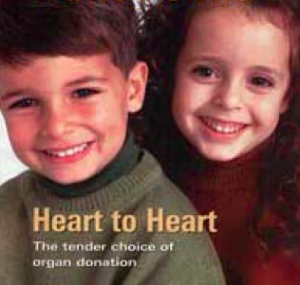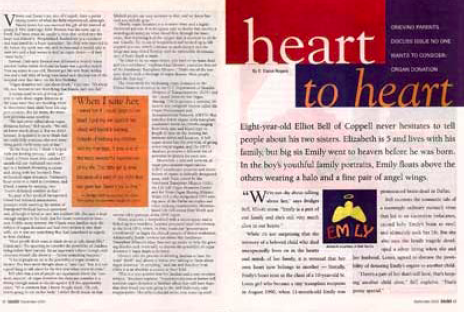SplendidStorySample – OrganDonationNonprofit
Published by a regional parenting magazine, this feature article highlights the activities of the medical nonprofit group, Southwest Transplant Alliance and the “silver lining” that comes with a set of parents faced with the tragedy of losing a child make a generous choice that saves another. Even a shorter version would help share their SplendidStory. Get started letting SplendidlySaid make you famous with a SplendidStory of your own. View our “conversation starter” templates HERE.
 Heart To Heart
Heart To Heart
The Tender Choice Of Organ Donation
Eight-year-old Elliot Bell of Coppell never hesitates to tell people about his two sisters. Elizabeth is five and lives with his family, but big sis Emily went to heaven before he was born. In his youthful family portraits, Emily floats above the others sporting a halo and a fine pair of angel wings.
“We’re not shy about talking about her,” says Bridget Bell, Elliot’s mom. “Emily is a part of our family and she’s still very much alive in our hearts.”
While it’s not surprising that the memory of a beloved child who died unexpectedly lives on in the hearts and minds of her family, it is unusual that her own heart now belongs to another – literally. Emily’s heart currently rests in the chest of a 10-year-old St. Louis girl who became a tiny transplant recipient in August 1990 when 11-month-old Emily was pronounced brain-dead in Dallas.
Bell recounts the traumatic tale of a seemingly ordinary stomach virus which led to an electrolyte imbalance, caused baby Emily’s brain to swell and ultimately tookher life. But she also says the family tragedy developed a silver lining when she and her husband Lester agreed to discuss the possibility of donating Emily’s organs to another child.
“There’s a part of her that’s still here, that’s keeping another child alive,” Bell explains. “That’s pretty special.”
Valerie and David Cary, also of Coppell, have a pretty strong notion of what the Bells experienced, although Valerie notes her son received the gift of life instead of giving it. Five years ago, little Trenton was the same age as Emily had been when he caught a virus that settled into his heart and dilated it. Hospitalized, hooked up to a ventilator and wait-listed for a heart transplant, the child was expected to die before the week was out with doctors saying it would take at least two and a half weeks to find an organ donor – if they “were lucky.”
Instead, Cary says Trenton got “a miracle” when another Dallas infant died and the heart was a perfect match. Now an active six-year-old, Trenton received his new heart within two and a half days of being wait-listed and checked out of the hospital nine days later on his first birthday.
“Organ donation isn’t just about death,” Cary says. “It’s about life too. Instead of two boys dying that March, only one did.”
It seems a bitter pill for grieving parents to talk about organ donation at the same time they’re deciding when to disconnect their child’s body from life support systems; but for many of those who take it, the aftertaste appears more bittersweet.
“We had never talked about organ donation before,” Bell recalls. “We didn’t know much about it, but we didn’t hesitate. … It appealed to us to think that we could help someone else and something good could come out of this.”
“In the long term, I think it helped with our healing process,” adds Cari Uland, a Frisco mom who lost her 17-month old son Nathaniel two years ago in a bathtub drowning accident and, along with her husband Dan, authorized organ donation. Nathaniel’s heart went to a child in Louisiana, and Uland, a nurse by training, says “there’s definitely comfort in that.” Given her medical background, Uland initiated resuscitation attempts while awaiting the arrival of Emergency Medical Services personnel, and although it failed to save her toddler’s life, she says it kept enough oxygen in his body for his heart to continue to function. Unlike many parents, the Ulands were familiar with the subject of organ donation and had even written it into their wills, yet, it wasn’t something they had considered in regards to their children.
“Most people don’t want to think about or talk about this,” Uland says. “It’s upsetting to consider the possibility of children dying before their parents. It’s an important subject though, and everyone should talk about it – before something happens.”
Bell adds that a lot of people are squeamish about the “cosmetic aspects” of organ donation, but doesn’t consider it a strong enough reason to decide against it if the opportunity exists.
“It’s a common fear, I know. “People think, ‘Oh yuk, you’re going to cut on her body.’ … I didn’t dwell much on that. Medical people are very sensitive to that, and we knew her soul was already gone.”
Clearly, organ donation is a tricky subject and a highly emotional process. It’s only an option in deaths that involve a neuroinjury, or when blood flow through the brain stops, thus depriving it of the oxygen that’s essential to all tissue. Usually, the victim is hospitalized and hooked up to life support systems which continue to push oxygen into the lungs and keep blood flowing until a concrete determination of brain death is made.
“In order to be an organ donor, you have to be brain-dead and on a ventillator,” explains Pam Silvestri, executive director of Dallas’ Southwest Transplant Alliance. “That’s one of the reasons there’s such a shortage of organ donors: most people don’t die that way.”
The framework for facilitating organ donation in the U.S. is overseen by the U.S. Department of Health’s Division of Transplantation (DOT) and a United Network for Organ Sharing. UNOS operates a national 24-hour-a-day computer system called the Organ Procurement and Transplantation Network (OPTN) that matches donor organs with transplant candidates based on criteria ranging from body size and blood type to length of time on the waiting list, immune status and location. A full organ donor has the potential of giving seven major organs, and the OPTN database generates a different list of potential recipients for each one.
Meanwhile, a national network of organ procurement organizations (OPO’s ) coordinates recovery and distribution of organs in federally-designated areas, with Texas served by the Southwest Transplant Alliance (STA), the Life Gift Organ Donation Center and the Texas Organ Sharing Alliance. While STA is the designated OPO serving most of the Dallas metroplex and other outlying communities, Houston-based LifeGift serves Ft. Worth and several other portions of the DFW region.
When someone is hospitalized with a neuroinjury and linked up to a ventilator, hospital personnel send out referrals to the local OPO, where “procurement coordinators” begin the clinical process of donor evaluation. Additionally, family services specialists like Southwest Transplant Alliance’s Mary Bauchert go on-site to help the grieving families and, eventually, to discuss the possibilities of organ donation if brain death is declared. Silvestri calls the process of allowing families to hear the word “death” and absorb it before ever talking to them about the possibilities of organ donation “de-coupling,” and she and Bauchert both claim it is an absolute necessity in their field.
“This is a very painful time for families and a very sensitive subject,” Bauchert explains. “Sometimes doctors or nurses will mention organ donation to families when they still have hope that their loved one isn’t going to die, and that’s very, very inappropriate. The subject should never, ever come up until after they’ve had a chance to absorb the fact that death has occurred. If they’re still in shock, it should never be brought up.”
Hospitals have varying procedures for the determination of brain death, often conducting tests six to 12 hours apart before confirming it. Meanwhile, families hold vigils in hospital waiting rooms, and Bauchert says family service specialists like herself offer them support, information and assistance with the array of problems that might arise during that time. Once contact is established, she continues to counsel them through the grieving process regardless of whether the family agrees to organ donation.
“We’re there to help soften the blow,” Bauchert says. “When families leave the hospital, that’s just to first step. They’re going to have holidays and all sorts of painful times to get through. …Sometimes I get calls from families months later who still need help dealing with the loss.”
Most deaths do not lend themselves to full organ donation – the heart, liver, lungs, kidneys and pancreas. However, Silvestri says even people who die in more common ways may be candidates for tissue donation, and a little-known fact is that as many as 50 people may be helped by tissue donations from one deceased person.
Currently, Silvestri says 72,000 Americans are on organ transplant waiting lists in the U.S. , including 4,000 in Texas and 1,500 in North Texas. On average, only 20,000 people get transplants every year — which means “a lot of people die before their match is found.” In the Dallas area, Bauchert estimates that the STA gets about 260 neuroinjury referrals a year, and of those, up to 175 will become potential donors.
A child in need of a transplant needs to receive it from a similarly-sized body, Silvestri explains, and since most donors are between the ages of 17 and 40, organ donation is even more difficult to come by for children with conditions like liver disease and heart defects. As such, one of the roles of organizations like the STA is to build public awareness and help reduce the numbers of people who die while still awaiting organ transplants.
Bell says she has never regretted the decision to donate her baby daughter’s organs, and says last summer, she finally met the child who is alive today because of Emily’s heart. Bell says she has never regretted the decision to donate her baby daughter’s organs, and says last summer, she finally met the child who is alive today because of Emily’s heart.
“When I saw her, I asked her if I could listen to her heart and she said ‘Yes.’” I put my ear against her chest and heard it beating. …Outside of birthing my children and my marriage, it was one of the most wonderful experiences of my life. This little girl is alive because of a part of our child that we gave her. There’s joy in that.”
As in the Bell’s situation, sometimes families of organ transplant recipients contact those of their organ donors, and Silvestri says her files are full of heartwarming tales of reunions between those who gave and those who got. The Cary’s met their donor family about a year after Trenton’s transplant, and Cary describes the similarities between the two families and the attachments they formed as “amazing.” The donor family subsequently moved out-of state, but Cary says they continue to keep in touch, exchanging photos and letters several times a year.
Bauchert, however, is quick to counsel people against agreeing to organ donation based on this expectation: “There are no guarantees,” she says. “People who agree to this should be doing it for the sake of giving the gift of life to someone lese; they shouldn’t be doing it because they expect the recipients to write them or contact them and express their gratitude.
If that happens, great; but if it doesn’t, that should be okay too.”
Likewise, authorizing organ donation doesn’t guarantee a successful match or even a successful transplant operation. Although it’s rare, there are times when a recipent who matches the donor’s blood type and body size isn’t found in a geographical area that makes the transplant possible, which means the family may give it’s approval for naught.
“That is very rare,” Bauchert says, “but, sometimes it happens. That’s why people have to do this knowing that there are no guarantees.”
Even so, Uland and Bell agree that the rewards of potential transplant success outweighs the risks of disappointing results. Somehow, even just attempting to help another child get a new lease on life appears to help grieving families deal with their own tragic losses. “It’s such an important thing to do,” Bell says. “Every chance I get, I tell people they ought to think about it and talk about it.’
And Cary says her son is a walking ‘poster child’ for organ donation. Touting her active first-grader’s involvement in karate, soccer and baseball, she explains: “When people find out he had a heart transplant, they’re shocked because he looks so normal and healthy. But that’s the thing: there are a lot of normal-looking people around who are only here because of the graciousness of a family who decided to donate.”
For more information about our SplendidStories program, click HERE.
* * * * * * *
Find the inspiration you need to plan out your own SplendidStory advertorial. Our selection of “conversation starter” TEMPLATES will help you decide what kind of SplendidStory will help you connect with customers and build your brand.
Click HERE and we can get started today TELLING YOUR TALE and developing the perfect SplendidStory advertorial for you and your website or collateral materials.
* * * * * * *
Need someone to “walk you through the process” of showing people what YOU know and putting your name on everybody’s lips? Contact us for assistance.
Call SplendidlySaid at 972-965-7947 or email Elaine Rogers at erogers@splendidlysaid.com.
Let’s discuss about how you can be sure that remedies you buy through a mail-order pharmacy are foolproof. There are hundreds of dependable internet drugstores that will deliver medicines to your address. Many drugstores offer to their customers Kamagra. Kamagra is a preparation used to treat few infections. What do you already know about viagra wikipedia? What consumers talk about generic viagra wiki? The most significant factor you must look for is how long does it take viagra to work. A overall sexual appeal among men is the erectile disfunction. What are the symptoms of sexual diseases? Like all medications, Kamagra have numerous unwanted effects. Together, you and your health care provider can decide if Kamagra or another remedy is right for you.

 Check out our FAVORITE FEATURES
Check out our FAVORITE FEATURES